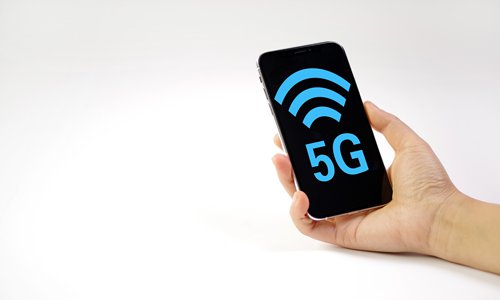HOME >> BUSINESS
China submits 5G technologies to ITU
By Chen Qingqing Source:Global Times Published: 2019/7/18 22:03:40
Huawei, ZTE are major patent holders

Photo: VCG
China has formally submitted its 5G technologies to the International Telecommunication Union (ITU), and analysts said that as Chinese companies have made considerable contributions to the next generation of wireless communication in patents and technology breakthroughs, it is highly likely the industry will adopt Chinese proposals as global standards.
The proposed solutions included radio interface technology based on technologies for new radio developed by 3GPP for 5G networks and the narrowband Internet of Thing, China's IMT-2020 promotion group - the official organization under the auspices of the Ministry of Industry and Information Technology - said in a statement sent to the Global Times on Thursday.
"Our submission represents China's understanding of 5G technologies, considering the integrity and advance of 5G technologies. Meanwhile, we support the development of a global unified 5G standard under 3GPP," the statement said.
3GPP is a global standards organization that collaboratively develops standards and specifications for the telecoms industry.
The Chinese delegation consists of representatives from major telecoms companies and research institutions including Huawei, ZTE, China Mobile, China Unicom and the China Academy of Information and Communications Technology.
Final results for global standards for 5G technologies will be announced in June 2020, according to the statement.
China has been in a leading position in 5G development, and the ITU submission shows the global industry's recognition of the country's contributions to the 5G sector. Once Chinese solutions are adopted, the nation will have more say in standard-setting, and future technology development, Li Zhen, an industry expert at Beijing-based CCID Consulting, told the Global Times on Thursday.
"It's very possible that [the Chinese standards] will be adopted," he said, noting that the Chinese companies, particularly Huawei, already have a large portfolio of 5G core technology patents.
In terms of 5G standard essential patents, Huawei has the largest portfolio followed by Nokia, ZTE, LG and Samsung, according to the data as of this month, compiled by IPlytics. The number of declared 5G patent families held by Chinese companies accounted for nearly 40 percent of total declared patents.
The US remains highly vigilant in keeping Huawei out of the country's 5G market, although US President Donald Trump had promised his government will ease restrictions on the Chinese company at a recent G20 meeting in Japan.
However, the US, as well as its major allies, could issue administrative orders to bar Huawei but they can't really avoid it because the tech giant has already established many footprints in 5G core technologies, analysts said.
"Also, 5G development is not led by the US, which needs support from different countries that have their respective strengths and weaknesses in research and development," Li said.
Huawei announced it would seek $1 billion in patent fees from major US carrier Verizon for more than 230 patents, which has become a common business practice, as the company is both a licensee and licenser of primary core patents, especially in 5G, Song Liuping, a senior executive of the company, told the Global Times in an interview in June.
On 5G, the company has contributed around 2,000 standard, essential patents, making the company top in the industry, Catherine Chen, board member of Huawei, told an ongoing panel in Brussels on Thursday in commenting the impact of Entity List US imposed on the firm.
Still, Chinese companies might face fierce competition from their foreign rivals in pushing forward their 5G technologies as global standards. South Korea, another leader in 5G commercialization, has also proposed the adoption of its 5G technologies, the Yonhap News Agency reported on Thursday, citing the country's science ministry.
Newspaper headline: China submits 5G tech to ITU
Posted in: INDUSTRIES,COMPANIES,BIZ FOCUS